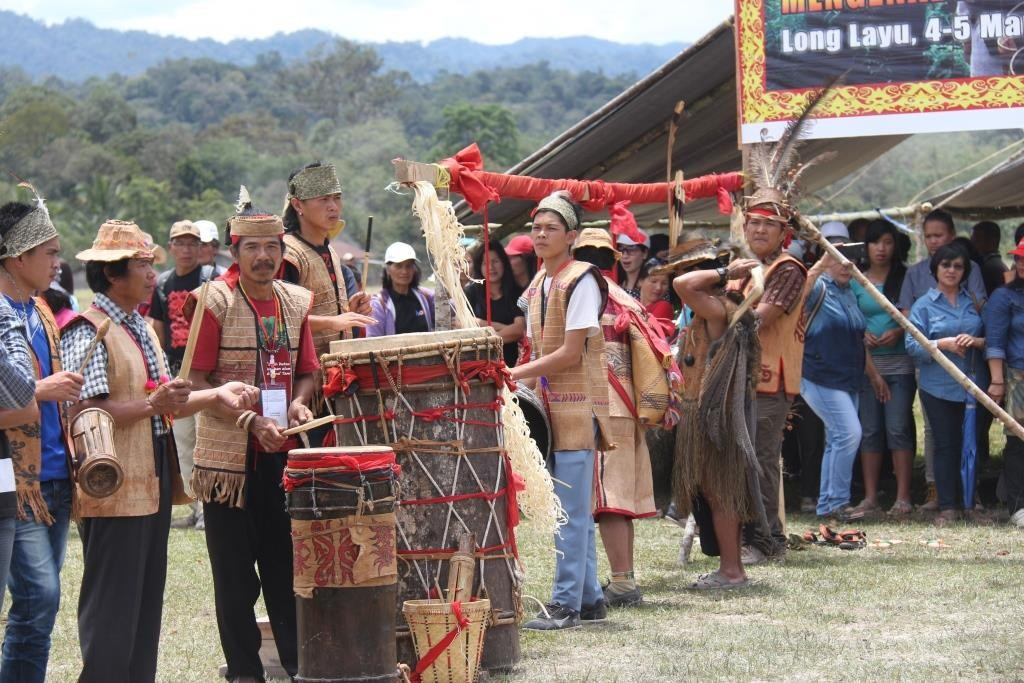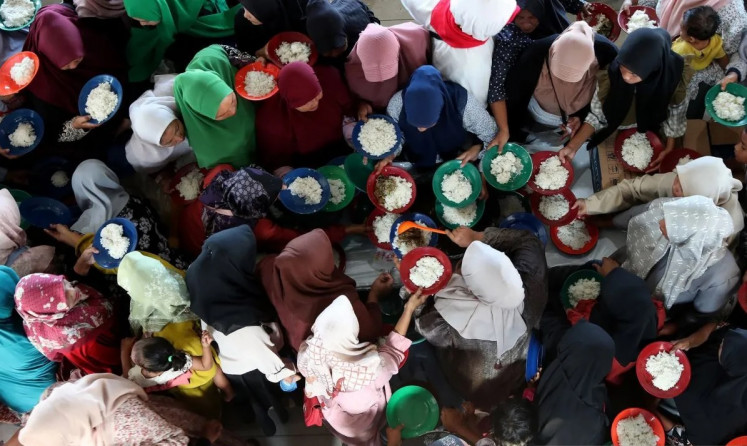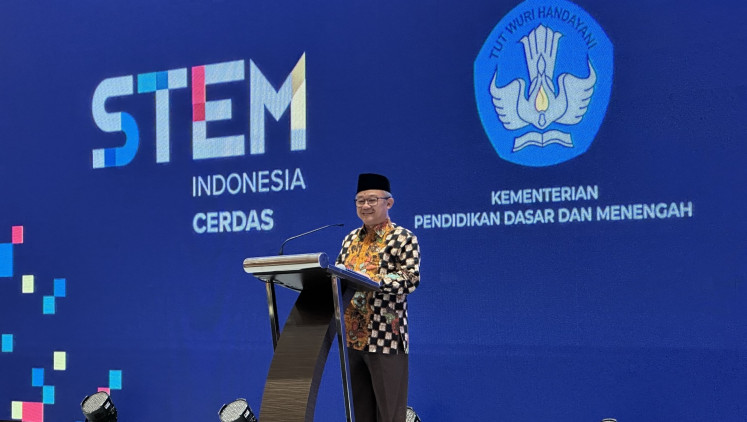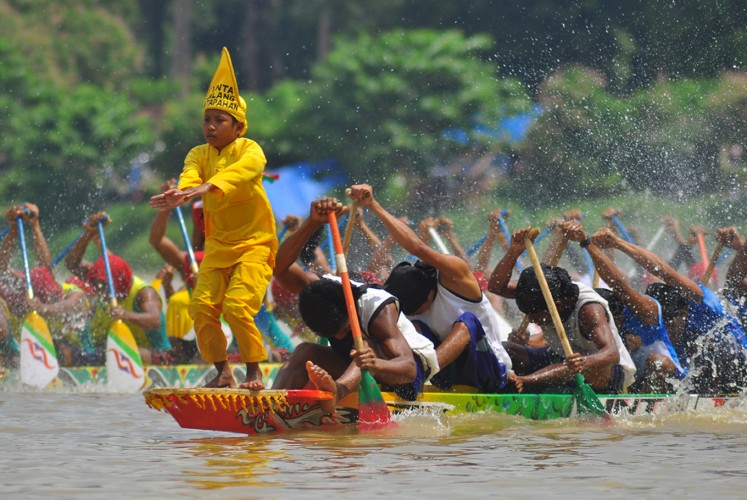Popular Reads
Top Results
Can't find what you're looking for?
View all search resultsPopular Reads
Top Results
Can't find what you're looking for?
View all search resultsWhy Indonesia should take a more active role in Taiwan Issue
Except for the majority of tribes in Papua, some in Nusa Tenggara and Maluku as well as a few others, most Indonesian ethnic groups today speak Austronesian languages.
Change text size
Gift Premium Articles
to Anyone
 The Alliance of the Indigenous Peoples of the Kayan Mentarang National Park (FoMMA) has joined the list of Indonesian indigenous groups that have been awarded with the prestigious UN Equator Prize. The FoMMA is one of the winners for the 2020 edition of the award, standing together with numerous civil society groups across the globe that have dedicated their time to environmental conservation in their home countries. (Courtesy of/UNDP Indonesia/-)
The Alliance of the Indigenous Peoples of the Kayan Mentarang National Park (FoMMA) has joined the list of Indonesian indigenous groups that have been awarded with the prestigious UN Equator Prize. The FoMMA is one of the winners for the 2020 edition of the award, standing together with numerous civil society groups across the globe that have dedicated their time to environmental conservation in their home countries. (Courtesy of/UNDP Indonesia/-)
I
once had a short conversation with two Chinese diplomats. On the many issues surrounding the country — turmoil in Hong Kong among them — I remembered one of them remarked that Taiwan was the red line, meaning China would do whatever it took to protect its sovereignty over Taiwan. And they were not afraid to do so, he added.
I took the diplomat’s words to mean that war was a possibility if conflicts between nations continued to escalate. Indeed, “the one exceptional trigger for a war involving China is Taiwan,” Kishore Mahbubani wrote in his recent book Has China Won? The Chinese Challenge to American Primacy. The answer is simple; the Chinese had learned the hard truth after years of humiliation from the Opium War to the end of the Chinese Civil War in 1949, and they wouldn’t let that happen again. Any suggestion from a Chinese leader to abandon Taiwan would be politically suicidal.
That moment I was reminded of my encounter during a collaboration project with archeologist Mitu M. Prie, who introduced me to the concept of Austronesia. The word “Austronesia” derived from the German austronesisch, which is based on Latin auster “south wind” and Greek νῆσος “island”. Austronesians, therefore, are people of the southern islands. Academics use this term to refer to people who speak Austronesian languages that mostly live in the island nations across the Indian and Pacific Ocean in the southern hemisphere.
It is almost universally accepted among linguists that Austronesian history began with groups of people who developed some distinctive languages and cultures after for some millennia being isolated in Taiwan. Known today as Taiwanese indigenous groups, some of these people after a long pause (about 1,500 years) are thought to have migrated to the Philippines, from where they spread the language, developed more advanced boat technology (outriggers and sails), and initiated what is known today as the greatest expansion of its time — the Austronesian expansion.
The Austronesian-speaking people through some period of time traveled as far afield as Madagascar in the west, Rapa Nui (Easter Island) in the east, New Zealand in the south and Hawai’i — and arguably southern Japan — in the north. Some argued that, due to their nature of being long-distance voyagers, Austronesians — and particularly Polynesians — might have touched the shores of South America, but mostly chose to return and reside in previously settled islands.
These groups brought with them domestic dogs, pigs, chickens, cultigens, pottery, loom weaving, tattoo culture, as well as seafaring skill and boat technology. Although the cultures and languages evolved through spatiotemporal differentiations as well as complex interactions with other non-Austronesian groups as they dispersed, the trace of similarities can still be identified to this day.
Having been previously settled by earlier groups — which included agriculturalists and seafaring groups — as well as later being situated at the crossroad of global trade, most Indonesians today are of mixed ancestry.
However, except for the majority of tribes in Papua, some in Nusa Tenggara and Maluku as well as a few others, most Indonesian ethnic groups today speak Austronesian languages, with the national language Indonesian being one of the examples. Moreover, a study published in 2014, which was based on samples that are limited to a number of ethnic groups, suggested that there were once substantial Austronesian migrations to Indonesia, with some ethnic groups in Indonesia today such as Toraja — and highly likely the majority of ethnic groups on Sulawesi Island — and Kambera people still having significant Austronesian ancestry (of similar genetic composition as indigenous groups in Taiwan); dominant among Batak Toba and Dayak ethnic groups as well as Malay people; and moderate among Javanese, Sundanese, and the rest that were studied.
Another genetic study published in 2016 found that both Indonesians and Taiwanese indigenous groups already shared genetic ancestry from postglacial migration of people from Sundaland thousands of years before the Austronesian expansion took place, and the expansion mainly brought acculturation and language shift rather than large-scale migrations to Indonesia.
On this latter stance, prominent linguist Robert A. Blust said the position was rather difficult to fathom, a view that is shared by archeologist Peter Bellwood. However, notwithstanding if the 2016 study was true, that does not eliminate the fact that Taiwanese indigenous groups do share a strong common ancestry with many Indonesian ethnic groups today and more importantly the fact that most Indonesians speak Austronesian languages.
Taiwan has understood and realized the significance and has attempted to embrace the Austronesian family especially in the Pacific countries, where the relationship between Taiwan’s indigenous languages and those of the regions is undisputed. The attempt was considered to be partly political for Taiwan to differentiate itself from mainland China. Some events such as the Austronesia Forum, which was on a hiatus since 2007 but resumed in 2018, have been held to consolidate the movement. However, the attempt has not yielded significant results.
Even today, China, argued by some to be the origin of pre-Austronesia, seems to be gaining traction among Pacific island countries in a diplomatic tug-of-war that will likely intensify in the foreseeable future.
Being the cradle of the Austronesian languages and cultures, I think it is in the interest of the Indonesian government and island nations across the Indian and Pacific Ocean to take an even greater active involvement in the Taiwan Issue. These countries, the Austronesians, should do whatever it takes to prevent conflicts from happening in this region, as they can obliterate the remnants of Austronesian origins.
As of 2019, about 70 percent of Taiwanese indigenous dialects had been classified as endangered languages, and some are dying out.
Furthermore, this should be the start for Indonesia to embrace the other Austronesian nations, less because of political motivation but more due to the awareness of the historical connection and the importance of preserving nature and particularly the oceans that connect the sparse islands in the southern hemisphere.
This is true especially in a time when the impacts of climate change loom and will heavily affect the island nations. The last time I saw the data, the Pacific island countries were among the worst performers in city governance. Indonesia too does not manage its urbanization effectively. As cities, if not well managed and sustainably developed, are among the main contributors to climate change, perhaps it is now more than ever that these island countries/regions — including Taiwan — joined hands to work on issues that matter to their existence.
***
The writer is a researcher at the Indonesian Institute of Advanced International Studies (INADIS).









